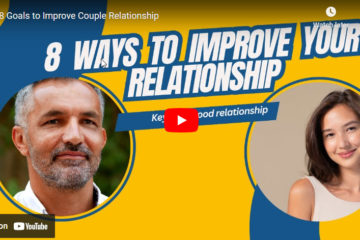Handling a relational breakup can be difficult and challenging, but here are a few steps that might help you navigate through this process:
#1 Avoid Blame

Refrain from blaming your ex-partner or yourself: It’s common to hold someone accountable for a breakup, but it’s crucial to keep in mind that relationships require two people. Instead of blaming yourself, try to concentrate on your own development and recovery. Don’t replay the breakup in your mind or how you will get back at your ex-partner. It’s time to move on.
#2 Reflect on the Relationship

Think about your emotions during and following the relationship. Did you experience happiness, sorrow, fury, or frustration? By being conscious of your feelings, you can better understand what you needed and wanted from the connection.
Think about the dynamics of the relationship. Were there any unfavorable trends, communication issues, or red flags? Consider both your partner’s and your own behavior. This could help identify your areas of personal growth as well as potential red flags for future relationships.
Take some time to consider your own desires and principles in a relationship. Think about the characteristics you value in a partner and what you need to feel happy. Knowing who you are will prevent you from settling for less than you truly deserve and enable you to make better decisions in relationships in the future.
Draw lessons from the prior collaboration. What did you learn about yourself, your needs, and your boundaries? Consider the lessons you can take away from this experience and the things you will do differently the next time.
#3 Allow Yourself to Grieve
It’s normal to feel depressed or furious after a breakup. It’s okay for you to experience these emotions, and you should allow yourself to mourn the broken bond. It’s critical to acknowledge and accept your emotions, whether they are joyous, sorrowful, guilty, or confused. Without suppressing or condemning your emotions, give yourself permission to experience and communicate them.
Seek support from loved ones, friends, or a therapist who can provide you with a safe space to discuss your feelings while also listening and understanding. Speaking with others about your thoughts and feelings can make you feel better and give them validation.

Grief takes time, and as time goes on, your feelings of grief may become less intense. Avoid pressuring yourself to “move on.” Rather, allow your own healing process to unfold. Recognize that recovery is a process that varies from person to person.
Treat people with care and tact. Be polite when you talk to people and thank them for their time and help. You should know that they may have other things they need to do, so be patient if they say they can’t help or need more time to reply.
#4 Establish Healthy Boundaries
Establishing healthy boundaries is essential, particularly if you and your ex-partner have decided to maintain contact or shared interests. Give yourself time and space to heal, and avoid any conversations or activities that might make you feel more uneasy or confused. Giving yourself time and space away from your ex will allow you to feel better about them down the road.
Establishing and maintaining reasonable boundaries is essential to maintaining healthy relationships. Take some time to determine what you can live with in terms of time, space, and emotional openness, as well as what you need and believe in. Pay attention to how you feel around different people and in different situations. Be mindful of any patterns of unease or animosity, and have faith in your gut. This could help you assess if someone is going too far in your boundaries.
Establish boundaries first in areas that don’t seem too challenging. It might get easier for you to put boundaries in other areas of your life and give you the confidence to express what you need. It should come naturally to you to refuse requests or demands that are at odds with your values or interfere with your schedule. Never forget that you have the right to prioritize your own needs and well-being. Regularly reaffirm your boundaries by responding to people who attempt to step over them with kindness but firmness. Even though some people may try to cross your boundaries, you need to stay firm and consistent.
#5 Be Ready to Move On
It’s important to let go and terminate the relationship at some point. Give yourself permission to start the healing process and to be receptive to new experiences and connections whenever you feel ready.
Remember that it takes time for a breakup to heal, so give yourself some grace during this time. It could be helpful to seek professional help from a therapist or counselor if you are struggling to deal with your emotions or have trouble controlling them.
It is possible to end a relationship with time and effort, despite the fact that it can be challenging. Recognize and accept your feelings: Accept that you are hurting and allow yourself to be sad that the relationship is over. Unprocessed emotions are common.
Unfollowing your ex-partner on social media and avoiding possible meeting places will help you distance yourself from their online persona. This will help you create a healthy atmosphere for yourself. Block your partner’s number if they continue to contact you negatively after the breakup.
Reach out to family, friends, or a support group to create a supportive environment that can offer solace, direction, and a listening ear. A strong support system can help speed up the healing process. Make new goals and aspirations for yourself. This makes it possible for you to direct your focus and energy toward growth and progress on a personal level. Seize the opportunity to learn more about your needs, desires, and identity. Think about the things you liked and didn’t like about the relationship, as well as your preferences for relationships in the future.
#6 Take a Holistic Self Care Approach
In order to properly take care of yourself, you must attend to your body, mind, and spirit. You can improve your physical health by getting enough sleep, eating well, and exercising on a regular basis. Take up things that make you happy. Enjoy life by pursuing your interests. Spend some time in prayer or meditation, and get to know your spiritual self. Healthy eating, exercise, socializing with close friends, prayer, and quiet meditation are all part of holistic health. It is essential to maintaining both your general and mental well-being. Read books that are uplifting and positive to gain wisdom. Fill your head with enlightening, constructive life issues.
#7 Find Support

Make a list of the precise assistance you require first. To effectively communicate your needs to others, be clear about the assistance you require. Give careful thought to whom you should ask for assistance. Examine their abilities, expertise, accessibility, and readiness to assist. Make sure your request is precise and concise. Clearly state the situation and indicate the type of assistance you require. Don’t be unclear or overly general.











